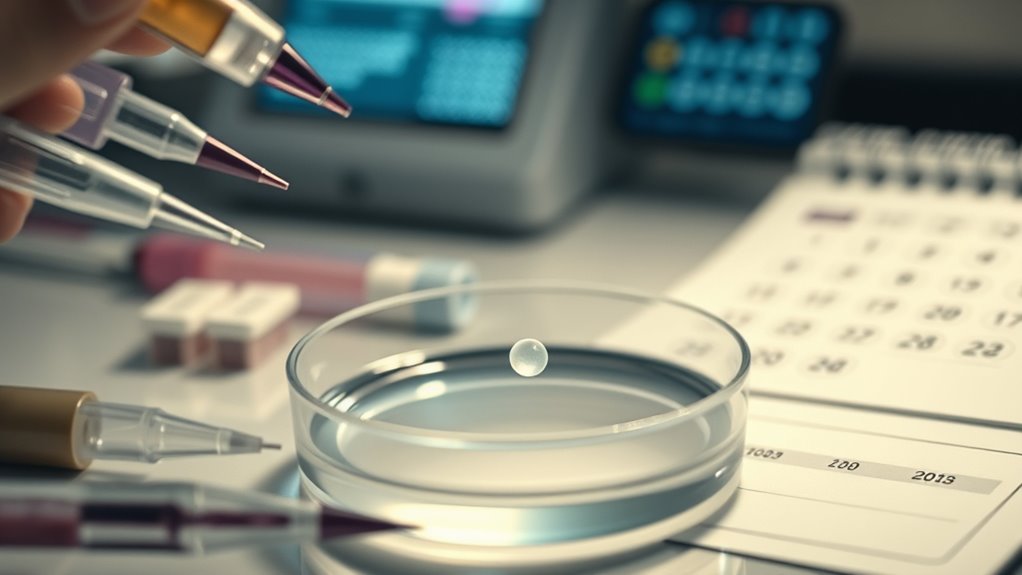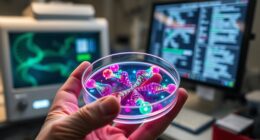A biochemical pregnancy is an early pregnancy loss that you might detect through a positive home pregnancy test. However, when an ultrasound is performed, it won’t show a developing embryo. This occurs when hCG levels initially rise but then decline, with no visible gestational sac. Common causes include genetic abnormalities and hormonal imbalances. It’s an emotionally challenging experience, but understanding it can help you prepare for future pregnancies. You can find more information below.
Key Takeaways
- A biochemical pregnancy is an early pregnancy loss detected by a positive home pregnancy test and no visible embryo on ultrasound.
- It often results from genetic abnormalities, hormonal imbalances, or insufficient uterine lining for implantation.
- Diagnosis involves monitoring hCG levels, which initially rise but then decline without fetal development.
- Emotional support is crucial as biochemical pregnancies can be emotionally challenging, though they typically do not affect future fertility.
- No specific treatment exists; monitoring hCG levels and consulting a healthcare provider for future pregnancies is recommended.

A biochemical pregnancy is an early pregnancy loss that occurs when a home pregnancy test detects the hormone hCG, but an ultrasound fails to show any developing embryo. Often called a chemical pregnancy or pre-clinical embryo loss, this type of pregnancy is typically identified through sensitive tests that can detect hCG before you even miss your period. Initially, your hCG levels may rise, indicating some level of pregnancy, but they’ll decline without fetal development. This is where it significantly differs from a clinical pregnancy, which can be visualized on an ultrasound.
Several factors can contribute to a biochemical pregnancy. Genetic abnormalities in the embryo are a primary cause, leading to chromosomal issues that prevent proper development. Hormonal imbalances can also play a role, as they might hinder the embryo’s growth. If the uterine lining isn’t sufficient for implantation, it can further complicate things. Underlying medical conditions, such as thyroid disorders, might also contribute to this early loss. Sometimes, delayed implantation occurs, resulting in insufficient hCG for the embryo to establish itself. Genetic abnormalities are often the primary cause of biochemical pregnancies, underscoring the importance of understanding potential risks.
Diagnosing a biochemical pregnancy generally involves monitoring hCG levels. You’ll see an initial rise, but when those levels start to decline, it’s a clear indication of a biochemical pregnancy. An ultrasound won’t show a gestational sac or fetal heartbeat, reinforcing the diagnosis. Blood tests can also help rule out other complications, like an ectopic pregnancy. Many women undergoing fertility treatments often catch biochemical pregnancies early, though symptoms may include light spotting or abdominal cramps.
While biochemical pregnancies can be disheartening, they don’t usually impact your overall fertility. They indicate your potential for conception, which is a positive sign. However, if you face multiple biochemical pregnancies, it might be worth consulting a healthcare provider for further evaluation. Emotional support is crucial during this time, as both biochemical and clinical pregnancies can be emotionally challenging experiences.
There’s no specific treatment for a biochemical pregnancy, but monitoring your hCG levels is essential to ensure they return to normal. You’ll also want to rule out ectopic pregnancies, which can pose serious health risks. Following up with your healthcare provider can help you navigate future pregnancies and ensure you’re well-supported through the emotional aspects of loss.
Understanding biochemical pregnancies can help you process your experience and plan effectively for what lies ahead.
Frequently Asked Questions
Can a Biochemical Pregnancy Lead to Future Complications?
A biochemical pregnancy typically doesn’t lead to future complications regarding your fertility. Most women go on to conceive successfully afterward.
However, if you experience multiple biochemical pregnancies, it’s wise to consult a healthcare provider. They can evaluate any underlying issues that might be affecting your ability to maintain a pregnancy.
Emotional support is also essential, as the experience can be challenging, so don’t hesitate to seek help if needed.
How Common Are Biochemical Pregnancies?
Biochemical pregnancies are surprisingly common, occurring in about 13% to 22% of pregnancies, whether through IVF or natural conception.
If you’ve recently tested positive for hCG but haven’t seen a gestational sac on ultrasound, you’re not alone. Many women experience this early loss, often detected before a missed period.
While it can be emotionally challenging, it usually doesn’t impact your future fertility or ability to conceive again soon.
Do Biochemical Pregnancies Affect Fertility?
Imagine a garden where flowers bloom and wilt, but the roots remain strong.
Biochemical pregnancies don’t usually affect your fertility. They’re like brief rain showers that nourish the soil without uprooting the plants. Most women go on to have healthy pregnancies afterward.
However, if you notice a pattern of early losses, it’s wise to seek guidance. Your future blooms can still be vibrant, given the right care and attention.
What Are the Signs of a Biochemical Pregnancy?
You might notice light spotting or mild abdominal cramps, which can feel similar to your menstrual symptoms.
Sometimes, your next period may be heavier than usual.
However, many biochemical pregnancies don’t show any signs at all, leaving you unaware.
The emotional impact can be significant, even if there are no physical symptoms.
It’s essential to acknowledge these feelings and seek support if needed, as the experience can be quite distressing.
Can I Still Try to Conceive After a Biochemical Pregnancy?
You might feel hesitant after a biochemical pregnancy, but you can still try to conceive soon.
While it’s natural to worry, your chances of a successful future pregnancy remain intact.
Just remember, consulting your OBGYN can provide you with valuable support and guidance.
Assessing your emotional readiness is crucial too, as it can help you approach this next attempt with confidence.
Conclusion
In the delicate dance of conception, a biochemical pregnancy is like a fleeting shadow—present yet ephemeral. While it may feel disheartening to learn that a positive test doesn’t always lead to a full-term pregnancy, it’s important to remember that this experience is part of the intricate journey toward parenthood. Each step, even the difficult ones, brings you closer to understanding your body and what it means to create life. Hope persists, as does the potential for tomorrow.









